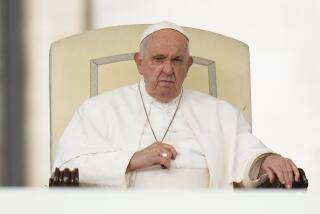‘Silent Support’ for Polish Vote Barred by Glemp
- Share via
WARSAW — Poland’s Roman Catholic primate, Cardinal Jozef Glemp, on Wednesday dismissed a claim by government authorities that the church is lending its “silent support” to national parliamentary elections next month.
Leaders of the outlawed Solidarity union have called for a boycott of the election, and some radical priests have implicitly endorsed the protest in sermons. Voter turnout for the Oct. 13 elections to the Sejm, the Communist-controlled Parliament, is viewed as a test of strength between the government and the opposition.
Deputy Interior Minister Wladyslaw Pozoga claimed in the Communist Party newspaper Trybuna Ludu last week that the church is giving its silent support to the election. Pozoga also claimed that Western intelligence agencies, in the hope of disrupting the elections, are plotting provocative attacks on Polish churches that would be blamed on the Polish security service.
Speaking to American reporters before his scheduled departure Sept. 17 for the United States, Glemp said it would be a “very arbitrary interpretation” to conclude that the church’s silence signaled its support. He added that he had not previously heard of any alleged plans for attacks on churches.
As for whether he himself would vote, Glemp smiled and said, “Ask me after the election.”
In the last nationwide elections, in June, 1984, the entire church hierarchy, including Glemp, failed to appear at the polls. Instead, they attended a religious conference.
Glemp’s trip to the United States is described as a purely religious, pastoral visit to Polish-American communities in Philadelphia, Washington and Detroit.
The Polish episcopate has said that no meetings with American officials are scheduled but has not ruled out the possibility of informal contacts with the Reagan Administration.
In contrast, Washington’s relations with Premier Wojciech Jaruzelski’s government are in so deep a chill that the Administration has made it known that it plans no contacts with Jaruzelski during his planned visit to New York later this month for the opening of the U.N. General Assembly.
Asked what he would tell Americans about the mood of Poland five years after the workers’ revolt that gave rise to the Solidarity union, Glemp said that more than anything he sensed that the nation is tired of tension and conflict.
More to Read
Sign up for Essential California
The most important California stories and recommendations in your inbox every morning.
You may occasionally receive promotional content from the Los Angeles Times.










